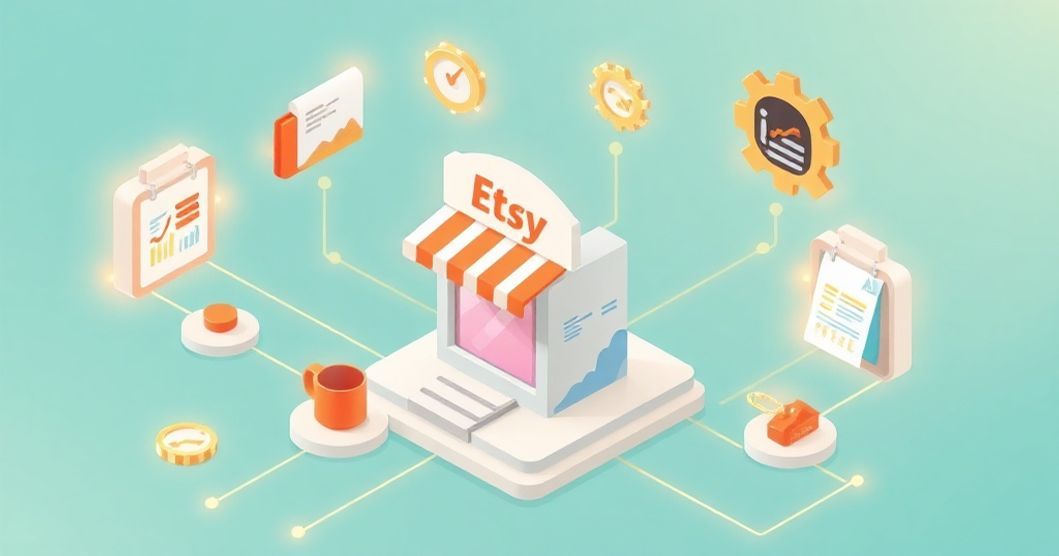In the dynamic world of online commerce, Etsy stands out as a unique marketplace for handmade, vintage, and craft supplies. As shops grow, managing various aspects from inventory to shipping manually can become time-consuming and prone to errors. This is where strategic Etsy integrations become indispensable, offering powerful solutions to streamline operations, automate repetitive tasks, and ultimately enhance productivity. By connecting your Etsy shop with specialized tools and platforms, sellers can unlock significant efficiencies, allowing them to focus more on creation and customer engagement rather than administrative burdens.
Understanding Etsy Integrations: A Gateway to Streamlined Operations
Etsy integrations refer to the process of linking your Etsy shop with third-party software applications, platforms, or services. These connections facilitate the automatic exchange of data and tasks, extending Etsy’s core functionalities. The primary value of these integrations lies in their ability to automate key business processes, thereby saving invaluable time, reducing manual data entry errors, and ensuring consistency across all sales channels. For a burgeoning Etsy shop, adopting integration tools can be a pivotal step towards sustainable growth and market expansion.
The core benefit of leveraging Etsy integration tools is the increased efficiency they bring to daily operations. Instead of manually updating stock levels on multiple platforms, processing shipping labels one by one, or inputting sales data into accounting software, integrations handle these tasks seamlessly. This automation not only frees up a seller’s time but also provides a more accurate and real-time overview of their business, from inventory counts to financial performance. Ultimately, these tools empower sellers to scale their operations without proportional increases in workload.
Essential Categories of Etsy Integration Tools
Etsy sellers often benefit from a diverse range of integration types, each designed to address specific operational needs. Understanding these categories helps in identifying the most suitable tools for your unique business model. From managing product stock across various marketplaces to simplifying the complexities of order fulfillment, these integrations form the backbone of an efficient multi-channel selling strategy.
Etsy Inventory Management Integrations
Effective inventory management is critical for any online seller, especially those engaging in multi-channel selling Etsy. Inventory integrations automatically synchronize stock levels across Etsy and other platforms like Shopify, WooCommerce, or even physical stores. This prevents overselling and ensures that customers always see accurate product availability. These systems provide a centralized dashboard to track stock, manage product listings, and often offer features for bulk editing and new product creation.
The primary advantage of robust Etsy inventory management integrations is the prevention of stock discrepancies, which can lead to customer dissatisfaction and negative reviews. By automating stock updates, sellers can confidently list their unique products across various marketplaces without the constant worry of selling an item that is out of stock. Such integrations also provide valuable insights into sales trends, helping sellers make informed decisions about restocking and product development.
Etsy Shipping and Fulfillment Integrations
Streamlining the shipping process is a major time-saver for Etsy shops. Etsy shipping integration tools connect your shop directly with shipping carriers (like USPS, FedEx, UPS) or fulfillment services. This allows for automated label generation, batch printing, and seamless tracking updates that are automatically sent to customers. Many of these integrations also offer discounted shipping rates, translating to direct cost savings for sellers.
Automated shipping and fulfillment processes significantly reduce the manual effort involved in preparing orders for dispatch. Orders placed on Etsy are automatically pulled into the shipping software, where labels can be created and printed with minimal clicks. This not only speeds up the fulfillment process but also enhances customer satisfaction through timely shipping notifications and accurate tracking information, building trust and encouraging repeat purchases.
Etsy Accounting and Bookkeeping Integrations
Managing finances accurately is paramount for any business. Etsy accounting integration tools connect your sales data directly with popular accounting software. This automation simplifies bookkeeping, tracks income and expenses, and prepares financial reports with ease. It eliminates the need for manual data entry, reducing the likelihood of errors and making tax season significantly less stressful for sellers.
By integrating Etsy with accounting platforms, sellers gain a clear and real-time picture of their financial health. Sales, fees, and payouts are automatically categorized and recorded, providing an accurate overview of profitability. This level of financial clarity is crucial for strategic planning, budgeting, and ensuring compliance with tax regulations. It allows sellers to focus on growing their business rather than getting bogged down in complex financial record-keeping.
Etsy Marketing and CRM Integrations
Beyond transactional aspects, marketing and customer relationship management (CRM) integrations can significantly boost sales and customer loyalty. These tools connect Etsy data with email marketing platforms, social media schedulers, or dedicated CRM systems. They enable sellers to automate email campaigns, schedule promotional posts, and manage customer interactions more effectively. Personalized communication builds stronger customer relationships and drives repeat business.
Leveraging Etsy marketing and CRM integrations helps sellers nurture their customer base and expand their reach. Automated email sequences for abandoned carts, follow-up messages after purchases, or birthday discounts can significantly enhance the customer experience. By understanding customer behavior and preferences through CRM data, sellers can tailor their marketing efforts, leading to higher engagement and a more loyal customer following.
Integrating Etsy with Major E-commerce Platforms
Many Etsy sellers choose to diversify their sales channels by establishing a presence on other e-commerce platforms. Integrating Etsy with these platforms is a common strategy to expand reach and leverage specific features offered by each.
Connect Etsy to Shopify for Enhanced Retail Features
Connecting Etsy to Shopify is a popular move for sellers looking to expand beyond the marketplace environment. Shopify offers extensive customization options, advanced marketing tools, and robust analytics that Etsy alone does not provide. Integration tools facilitate the seamless transfer of product listings, inventory, and orders between Etsy and Shopify, allowing sellers to manage both storefronts from a centralized dashboard. This multi-channel approach can significantly increase sales volume and brand visibility.
While Etsy provides a ready-made audience, Shopify offers greater control over branding and customer experience. Integrating the two platforms allows sellers to leverage Etsy’s marketplace for discovery while directing repeat customers to their branded Shopify store for a more curated shopping experience. This dual presence optimizes profitability by diversifying revenue streams and reducing reliance on a single platform, while maintaining synchronized product information and avoiding overselling.
Etsy and WordPress/WooCommerce Integration
For sellers who prefer an open-source, highly customizable e-commerce solution, integrating Etsy with a WordPress website running WooCommerce is an excellent option. This setup provides complete ownership of the storefront, design flexibility, and access to a vast ecosystem of WordPress plugins. Integration plugins and services can help sync Etsy listings, orders, and inventory with your WooCommerce store, ensuring a consistent product catalog across both platforms.
The benefit of an Etsy and WordPress/WooCommerce integration lies in establishing a strong brand presence outside of the marketplace. Sellers can create a unique online store that perfectly reflects their brand identity, offers unique payment gateways, and provides advanced blogging and SEO capabilities. This allows for direct customer relationships and often higher profit margins due to fewer platform fees, while still benefiting from Etsy’s established customer base for discovery.
Automating Your Etsy Shop: Beyond Basic Integrations
Beyond the core operational integrations, several specialized tools offer deeper levels of automation, catering to specific business models and advanced marketing strategies.
Etsy Print-on-Demand (POD) Integrations
For sellers offering custom-designed products, Etsy print-on-demand integration is a game-changer. These integrations connect your Etsy shop with POD service providers. When a customer places an order, the integration automatically sends the design and order details to the POD company, which then prints the product and ships it directly to the customer. This eliminates the need for sellers to manage inventory, production, or fulfillment themselves, making it an ideal model for artists and designers.
Etsy print-on-demand integration allows creators to offer a wide range of products—from apparel and mugs to home decor—without upfront investment in stock. The process is entirely automated from sale to delivery, freeing up the seller’s time to focus on new designs and marketing. This model significantly lowers the barrier to entry for many creative businesses, enabling them to scale their product lines with minimal operational overhead and risk.
Social Media Scheduling and Analytics Integrations
In today’s digital landscape, a strong social media presence is crucial. Integrations that connect your Etsy shop or product feed with social media scheduling tools allow for automated posting of new listings, promotions, and shop updates across various platforms. Furthermore, analytics integrations provide insights into which social media efforts drive the most traffic and sales to your Etsy shop, helping refine your marketing strategy.
Automating social media presence ensures consistent brand visibility and keeps your audience engaged without constant manual effort. By scheduling posts in advance, sellers can maintain an active presence even during busy periods. Moreover, leveraging analytics from these integrations helps optimize content and timing, ensuring that marketing spend and effort are directed towards the most effective channels, ultimately driving more qualified traffic to your Etsy listings.
Choosing the Right Etsy Integrations: Key Considerations
Selecting the appropriate Etsy integration tools requires careful consideration of several factors specific to your business needs and goals. The right integration should align with your operational scale, budget, and desired level of automation, ultimately contributing to your shop’s overall efficiency and growth.
First, assess your shop’s current size and complexity. A small shop with limited listings might not require the same comprehensive suite of tools as a large multi-channel operation. Consider which manual tasks consume the most time and pinpoint specific pain points that an integration could resolve. This focused approach ensures that you invest in tools that provide tangible benefits rather than unnecessary features.
Secondly, evaluate the pricing models and your budget. Many integration tools operate on a subscription basis, with varying tiers based on features, transaction volume, or number of users. Some might offer transaction-based fees. Compare these costs against the time savings and efficiency gains to determine the return on investment. Ensure the pricing is scalable with your business growth, allowing for seamless expansion without unexpected costs.
Finally, consider the ease of use, setup complexity, and customer support offered by the integration provider. A user-friendly interface reduces the learning curve and allows for quicker implementation. Robust customer support is crucial for troubleshooting any issues that may arise, ensuring minimal disruption to your operations. Investing in a tool with strong support can save significant frustration and time in the long run.
Conclusion: Empowering Your Etsy Shop with Strategic Integrations
Strategic Etsy integrations are more than just technical connections; they are powerful enablers for growth and efficiency for online sellers. By automating inventory, streamlining shipping, simplifying accounting, and enhancing marketing efforts, these tools free up valuable time that can be reinvested into product development, creativity, and customer engagement. The ability to connect Etsy with other major e-commerce platforms further expands a seller’s reach, opening new avenues for sales and brand building.
Embracing the right Etsy integration tools transforms a labor-intensive operation into a smooth, efficient, and scalable business. Sellers gain greater control over their operations, reduce manual errors, and improve customer satisfaction, all while maximizing profitability. Exploring the diverse range of available integrations is a critical step for any Etsy entrepreneur looking to optimize their workflow and unlock their shop’s full potential in the competitive online marketplace.






